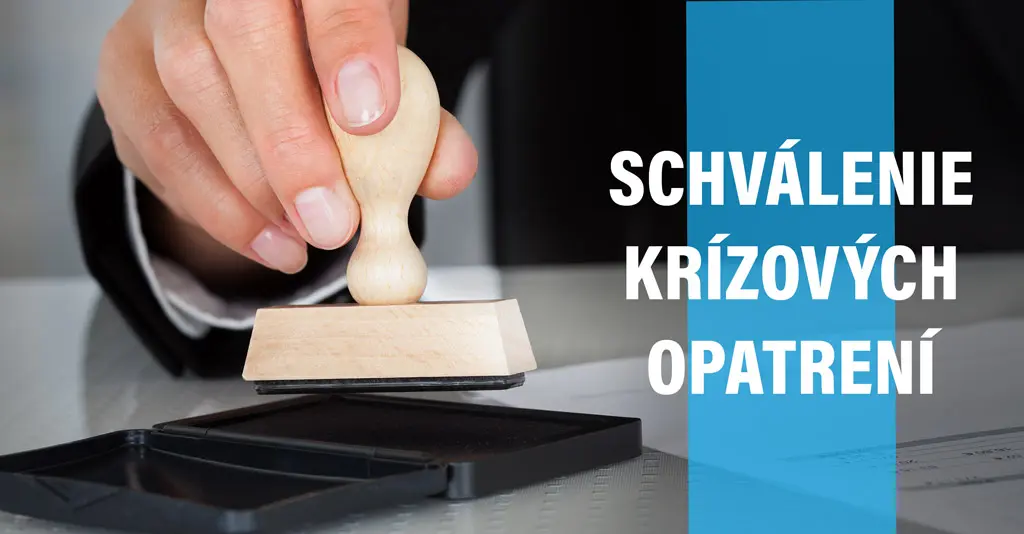Over the weekend, the government adopted the first seven key tax and levy measures to help business owners, employers and employees significantly. An amendment to the laws will be necessary to confirm them, and their final implementation is expected later this week.
Reimbursement of salary to employees
Those employees who are forced home because the State has compulsorily closed their premises by their employer will receive compensation of 80% of their salary. Compensation shall be paid to the employee by their employer. Consequently, at the employer's request, the State reimburses all this compensation to the employer of 80 %.
The employee will be charged a levy of 13.4% and a tax of 19%. If the employee was earning EUR 1 000 per month, the employer pays him compensation of EUR 800, with a deduction of EUR 107 and, taking into account the non-taxable part of the taxable amount, a tax of EUR 62. Thus, from the compensation of 800 euros, the employee receives a net 631 euros.
In addition to the contributions attributable to the employee, the employer is also obliged to pay contributions from the compensation. Whether the 35.2% employer levy will be borne by the employer himself or reimbursed by the State is not yet entirely clear. If those contributions had to be borne by the employer, the employer's contributions would have been EUR 282 in compensation for the salary of EUR 800.
In order to receive an allowance from the State,the employer may not dismiss his employee for a period of six months after the end of the receipt of the allowance.
Per employee, the State shall make a contribution of up to EUR 1 100 per month and the maximum possible total amount of the contribution per employer shall be EUR 200 000 per month.
Contribution in the loss of turnover
Furthermore, the State will make contributions to those firms and sole traders who, although they did not have to close their premises, have had their sales significantly reduced as a result of the pandemic. The State will therefore grant a contribution to firms for each employee and sole trader, depending on how significantly their turnover has fallen.
In the case of sole traders with decreased turnover, who also employ employees, we assume that the contribution will be paid to the sole trader and to each employee.
Business owners and employers who have had their sales fall by more than 20 % in the whole calendar month will contribute EUR 180 to the State, a 40 % contribution of EUR 300 in the case of a 40 % decrease in turnover, a reduction of EUR 420 and a 80 % reduction in sales, a contribution from the State to employers and sole traders of EUR 540.
Monthly sales are to be compared by companies and sole traders with the same period last year, i.e. employers or sole traders compare the sales achieved, for example, in April 2020 with those achieved in April 2019.
The State will start paying contributions on the basis of applications submitted from 15 April, with a maximum possible contribution per employer per year of EUR 800 000. As a first step, the State will not verify the sales data in the applications or solemrant declarations made and will send the contributions on the basis of requests to all, but in the case of incorrect data, the State will recover the unduly granted contribution and will also impose a penalty on such an entrepreneur.
Provision of bank guarantees
The State will guarantee banks that grant loans to entrepreneurs that, if the entrepreneur is unable to repay the loan, it will be repaid for it by the State. Bank guarantees will amount to EUR 500 million per month. The specific form of the provision of the bank guarantee will depend not only on the final form of the law but also on the individual repayment terms agreed by the entrepreneur with the specific bank.
Deferral of payment of levies
Those sole traders and employers whose revenues will fall by more than 40% will be able to defer payment of contributions. We assume that this will be a deferral of the payment of contributions for the next 3 months, with entrepreneurs having an additional 18 months to pay these contributions, during which time they will be able to pay these contributions in instalments.
Compensation of wages for quarantined employees and parents in the Czech Republic
If the employee has been ordered to be quarantined due to the possible spread of the coronavirus, the employee is reimbursed not by the employer but by the Social Insurance Agency from day one at the rate of 55 % of the basis of assessment.
Likewise, the State shall provide 55 % of their gross wage to parents or insured persons caring for their child or a member of their family for the entire coronavirus emergency.
You can also find out about the payment of compensation for compulsory quarantine and infirmary in our previous article.
Deferral of payment of advances
Another measure by the government is the possibility of deferring advance payments to those entrepreneurs who have seen their sales fall by more than 40%.
Under the current measures, entrepreneurs no longer have to pay advances until the end of June. Advances will not have to be paid for another 3 months if their sales fall by 40%. Advances will not take effect until October 2020, with the advances paid being included in their tax return with total tax for the whole calendar year 2019.
Possibility of offsetting an unapplicated loss
Businesses and entrepreneurs will be able to count the tax losses they have reported so far in 2014-18. They will probably already be able to count these unapplicated tax losses in the 2019 tax return. If companies and businesses have already filed their 2019 tax returns, they will be able to file additional tax returns and deduct unapplicated tax losses for 2014-18.
The details of the government's individual actions are not yet known. We will inform you of the exact forms of these measures as soon as they are published.

